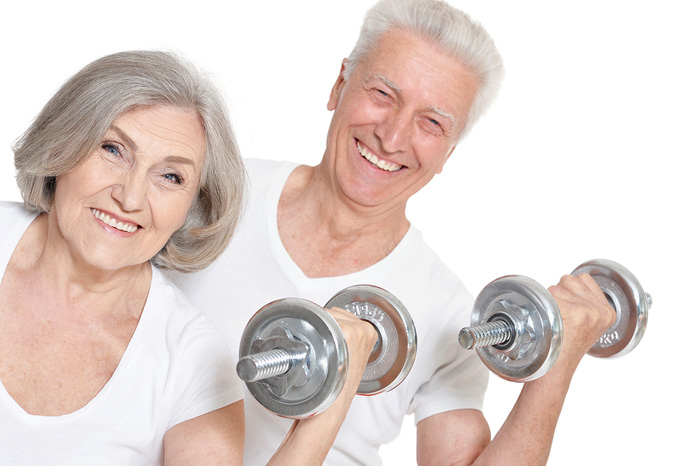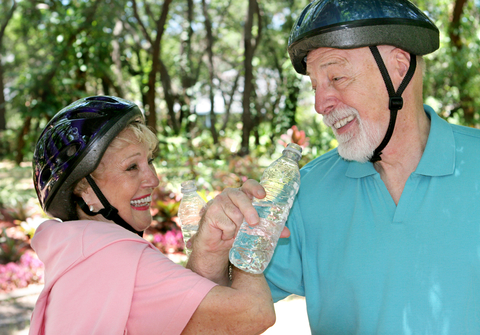Running vs Walking
 Senior Couple Powerwalking
Senior Couple PowerwalkingPrior to exploring running vs walking, it's important to note that the research is overwhelmingly clear that a sedentary lifestyle significantly increases numerous health risks and shortens lifespan.
Both running and walking offer quality of life benefits such as:
- Stress reduction;
- Increased circulation which delivers oxygen and nutrients throughout the body, lowers blood pressure, reduces the risk of stroke, and lowers cholesterol;
- Mood elevating effects of released endorphins;
- Protection against depression and reduction of symptoms;
- Reduced anxiety;
- Calorie burning for weight loss;
- Toned leg muscles;
- Improved cognitive function;
- Reduction in the risk of type 2 diabetes;
- Greater cardiovascular health; and
- Increased energy.
Running vs Walking -- So, What's the Difference?
Weight Loss
In terms of weight loss, the growing body of evidence indicates that running is best. Running burns more calories in less time.
A study comparing runners to walkers in The Journal of Obesity, found that runners experienced suppressed appetites while walkers’ appetites remained strong.
Running as high-intensity exercise elevates metabolic rate for a longer period of time after the exercise than walking – that means a longer period of calorie burning.
Time & Distance Factors
Running improves fitness more efficiently than walking and delivers more health benefit in terms of time invested. In other words, it takes more time walking than running to produce the same health benefits.
It takes 1 ½ to twice the distance to expend the same amount of energy walking as running. When comparing running vs walking briskly mile for mile, a study showed that both lowered risk for diabetes, high blood pressure and high cholesterol.
Approximately 200 calories can be burned by running six-miles per hour for ten minutes, or 300 calories during a brisk walk for one hour.
Potential for Injury
Walking is best for people who are obese or have problems with their ankles, back, knees, or injury.
Studies have found that running injury rates are significantly higher than walking injuries. Walking places less stress on joints and decreases the risk of injuries such as runner’s knee, and muscle strains.
Exertion
More is better. Exertion is the key for increased levels of fitness, no matter what form of exercise you choose.
Although running expends 2.5 times more energy than walking, the effort during walking can be increased by increasing the pace, walking up hills, or wearing a weighted vest.
BONNIE'S FAVE!
Finding the Sweet Spot -- High-Intensity Interval Training (HIIT)
There is growing evidence that increasing time and/or intensity of any physical activity is better than steady-state exercise.
Alternating between running and walking is the very essence of interval training. Interval training is proving to greatly reduce abdominal fat, build strength, increase cardio endurance, and break through plateaus.
Mix it up, whether adjusting the settings on a treadmill, or walking up hills to increase demand on the glutes, calves and quads.
Still Undecided?
Maybe you don’t have to take a hard-line position on running
vs walking. The answer varies from person to person. Depending on your goals, fitness
level, health condition and personal preference, you can reap the benefits of
both by adding the variables mentioned above to increase heart rate for aerobic
fitness, time or distance for endurance, and intensity for strength.
When considering the possibility of injury, keep in mind that strength training is integral to overall fitness and may help to prevent running injuries.
The only wrong decision is to do nothing.
More Topics That May Interest You
Some of the advertisers on my website are affiliate partners, which means that I may receive a small commission from any sale, at no extra cost to you.
For example, the Amazon affiliate advertising program is designed to provide a means for sites to earn fees by advertising and linking to amazon.com.
Your tips and purchases help to support this free-information website.
Thank you.
The content of this website is for informational purposes only and not intended to be taken as a replacement for professional medical advice, care, diagnosis or treatment by a doctor, dietitian, physical therapist, nutritionist or fitness instructor.
DO NOT BEGIN ANY EXERCISE PROGRAM WITHOUT CHECKING WITH YOUR DOCTOR FOR UNDERLYING CONDITIONS THAT MAY PREVENT YOU FROM DOING SO.








